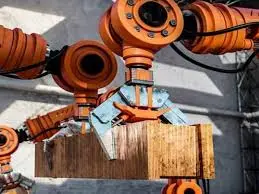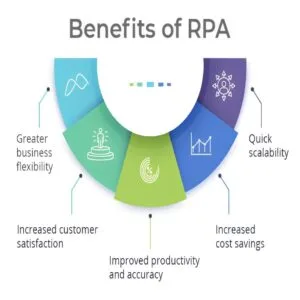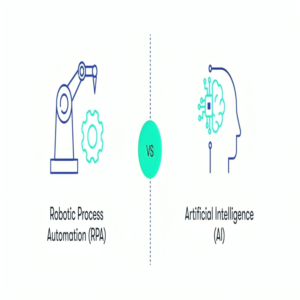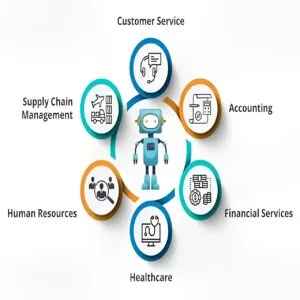One can literally refer to RPA as a friend. It feels like having a small personal assistant who is as good at his computer assignments as you are.
This tech-Savy friend can extract data, scroll through hundreds of applications at a time, peck rapidly on the keyboard, and make sense of what is on the screen at superhuman speed, all without ever breaking a sweat or needing a refill on their coffee cup. In effect, this is like an online helping partner.
Demand for Robotic Process Automation:

In the rapidly changing technological environment, organizations are always considering new and innovative methods to enhance productivity and simplify processes. Robotic Process Automation is just one such game-changer that is able to bring diverse benefits beyond the conventional areas in an organization.
In this research, we dig deeper into the area of robotic process automation and see how RPA improves business activity and what really makes it superior to Artificial Intelligence (AI).
We will also go through the different domains in which RPA can be implemented, changing processes in different sectors.
Understanding RPA as a Business Improvement:
The core purpose of RPA is to bring improved efficiency to companies. RPA relieves human resources from routine tasks by getting rid of repetitive and rule-based procedures, making them free to focus on key, value-added projects.
This also brings about substantial cost savings in addition to improving operations. With RPA taking over repetitive operations and providing accuracy and efficiency, businesses can enjoy a rise in productivity.
Business Benefits of RPA:

There are several benefits associated with using RPA in business activities. Some of such benefits include decreased error rates and faster processing times with increased accuracy.
RPA increases the operational efficiency of organizations by automating processes. This, in turn, raises competitiveness and customer satisfaction. Flexibility, scalability, and affordability add to the attraction of RPA as a game-changing instrument for companies of any kind.
Understanding RPA and AI:
Though RPA and AI are used as overlapping terms in most instances, there lies a lot of difference between the two. The main essence of RPA will be to regulate rule-based processes.

Routine tasks with well-defined procedures—perfect for jobs such as data entry, processing payments, and reports. RPA works within predefined limits. It mimics human behavior but does not need the ability to learn or decide.
Artificial Intelligence:
In contrast, Artificial Intelligence goes beyond technology. It means endowing systems with decision-making, learning, and adaptive capabilities.
Artificial intelligence combines various machine learning algorithms to execute activities that involve thought processes and decision-making.
Artificial intelligence with natural language processing. Unlike RPA, AI can analyze data, recognize patterns, and evolve in the long term.
When RPA Finds Its Niche:
RPA is the most exciting technology in the banking industry today. It’s going to automate billing and payroll processing and balancing, accurately and safely.
This reduces the likelihood of errors and gives more time to the finance professional to do analytic and strategic financial planning.
Human Resources:

RPA improves hiring, onboarding, and management of benefits—all areas revolutionized within human resources.
Enabling HR teams to have more time to spend on strategic workforce planning, talent development, and employee engagement, this beholds.
Client Support:
The RPA also helps to enhance customer service. It may improve customer satisfaction by providing quicker and more efficient service through automation of the routine customer queries, order processing, and issue resolutions.
Medical Care:
RPA simplifies all sorts of activities in the healthcare industry, from making appointments and managing claims to billing.
This frees the more significant time of the healthcare workers to concentrate on patient care and making decisions.
Logistics and Supply Chain:
In supply chain and logistics, RPA is already being applied to order processing, inventory control, shipment tracking, amongst others, entirely automating these activities.
The impact resulting from responsive supply chain management, flexible enough, reduces time-to-market, thereby improving overall efficiency.
RPA in the Future:
While companies are increasingly embracing digital transformation, the function of RPA will continuously change; unlocking higher potential is a call and combination with modern technologies like Artificial Intelligence and Machine Learning.
The interplay between RPA and AI will make it possible for businesses to simplify complex operations, make data-driven decisions, and adapt to dynamic conditions.
Conclusion:
Therefore, business robotic process automation is one of the most important drivers of changes in the business environment. It is considered to be a very important asset for companies running different sectors due to its potential for enhancing productivity, cost reduction, and efficiency building.
Organizations looking to capitalize on the insidious potential of RPA must study their various uses and understand subtle differences between them and AI.
This use of RPA is not just a technological step forward into the future, but rather a cultural shift, for companies only exist and extend their borders within this digital world.






Good web site! I truly love how it is easy on my eyes and the data are well written. I am wondering how I could be notified whenever a new post has been made. I’ve subscribed to your RSS which must do the trick! Have a nice day!